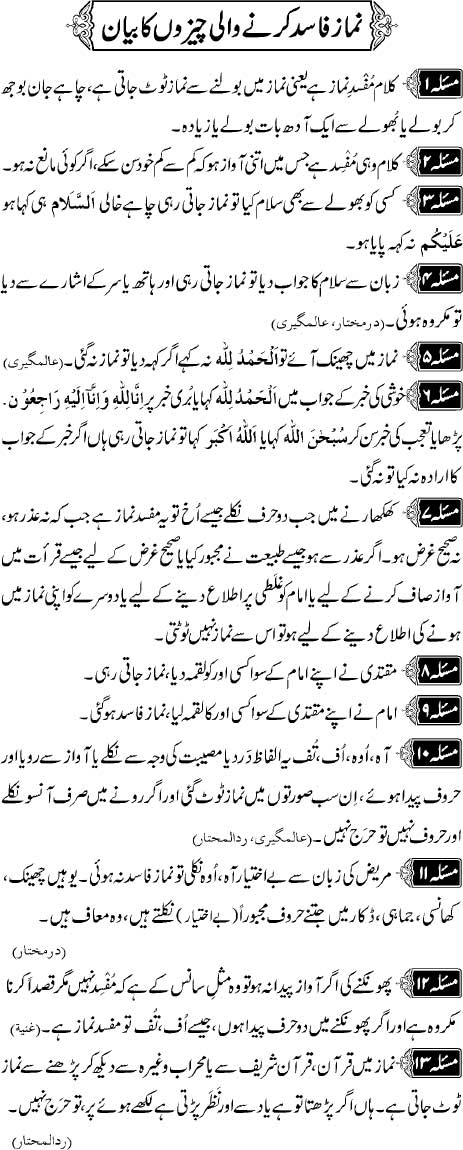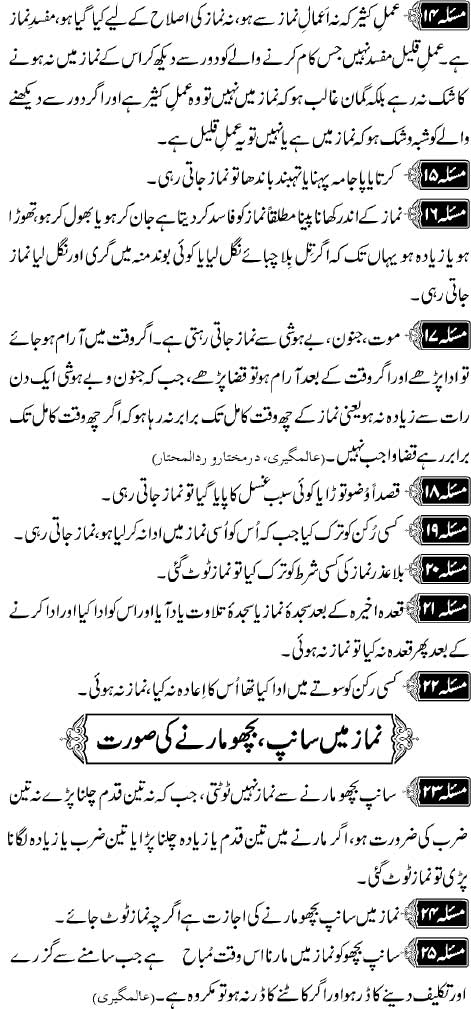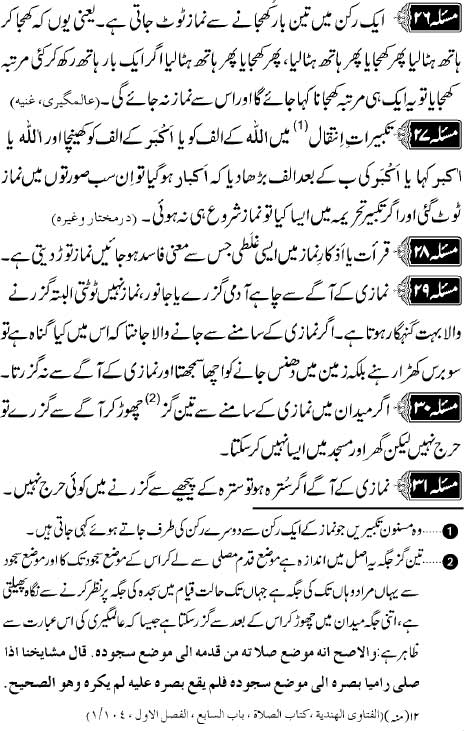
Azan And Iqaamah (Call To Prayer)
To give the Azaan for Salah is proven from the Holy Quran-e-Majeed. Almighty Allah says in the Glorious Quran: “And when you call the Azan for Salah”.
The Ulema have stated that to give Azaan for the five daily Salaah including Jummah Salah, is Sunnat-e-Mu’akadah and if the Azaan is not given by anyone, then the people of the entire area are sinners individually. With the exception of the Fardh Namaaz, there is no Azaan for the two Eids, Witr, Janazah Salaah, or any Nafil Salaah. The time for Azaan is the same time as that of Namaz. It is not permissible to give any Azan before the time of that particular Salah.
One who gives the Azan must be a Sunni Sahihul Aqeedah person who is in his proper sense of mind. If Azan is given without Wudhu, it will be complete, but it is not correct to do so. It is not permissible for a person who is in an impure state, an insane person, an intoxicated person, or a Faasiq (open sinner) to call out the Azan. It is Makrooh-e-Tahreemi for women to give the Azaan or Iqaamah. Azan must be given standing facing the direction of the Qibla, with the index fingers in the ears. The Azan must be called out with a loud voice, pausing after each Takbeer. The Azan must be given outside the actual Musjid and not inside as this is Khilaaf-e-Sunnah (against the Sunnah) and Makrooh. This law even applies to the Azaan of the Jummah Khutba. Azan should not be given in front of the Mimbar, but outside the main Musjid, but standing in line with the Khateeb.
To reply to the words of Azan is Mustahab. When the Mu’azzin says, “Hayya Alas Salaah” and “Hayya Alal Falah”, then you should say, “Laa Howla Wa laa Quw’wata illa Billahil Aliyul Azeem”. In the Azaan of Fajr, when the Mu’azzin says, “As Salaatu Khairum minan Naum”, then you should say, “Sadaqtu Wa Barartu”.
It is not allowed to give an answer to the Azan during the Khutba of Jummah. It is important to remain silent and listen to the Khutba. When Azan is read, all talking should stop. Even if a person is reciting the Quran, he should stop and answer the Azan. Even when walking on the street, one should stop and give answer to the Azan when it is heard. If in your area, you are able to hear the Azan of various Masaajid, then you should answer the first Azaan that you hear. In one Hadith, The Holy Prophet (sallal laahu alaihi wasallam) stated: “Freedom from the fire of Hell is written for that Muslim who calls out the Azaan for seven years.”
Benefit In The Answer To Azan:
Once while speaking to a group of women Huzoor-e-Anwar (sallal laahu alaihi wasallam) said: “When Hazrat Bilal (radi Allahu anhu) calls out the Azan and Takbeer, then say as he says, since for every Kalma (word) Almighty Allah will bless you with one hundred thousand good deeds, He will exalt your status by one thousand folds and He will forgive your one thousand sins”. The women then asked, “And what is (the reward) for the menfolk ?” The Prophet (sallal laahu alaihi wasallam) replied, “Double that amount.”
Let us take some time to ponder on this fact, in the Azan of one day, there are seventy-seven words, and in the Iqaamah of one day, there are 85 words. If the Sawaab for the women was so great then imagine it being doubled for the men. Then think that this is for one day, what is the Sawaab of that person whose daily practice this is. Subhan-Allah!
Dua After The Azan:
“O Lord of this beautiful Azan and the Salah which will follow, give our Master Muhammad (sallal laahu alaihi wasallam’s) Wasila and greatness and a very high station. And let him reach the Plain of Mahmood of which You have promised him and let us receive his Intercession on the Day of Qiyamah. Without doubt, You never go against Your Promise.”
Other Instances Where Azan Can Be Given:
With the exception of Namaaz, it is also Mustahab (desirable) to give Azan in the following instances:-
- To give Azan at times of fear brings tranquillity.
- During an uncontrollable fire. Insha-Allah, the fire will be quickly extinguished.
- Azan can be given in the ears of a person to remove fear and sadness.
- At the birth of a child, Azan should be given in the right ear and Iqaamah in the left ear.
- Azan can be given at the grave-side to give Sukoon (tranquillity) to the deceased.
- Say Azan to cure somebody who is affected by Jinnaat or Shaitaan.
- During the time of the storm.
- To ask for rain during drought, or to stop a heavy storm.
- When lost in a forest, by saying Azan, someone will show you your way.
- Saying Azaan in your business or residence will increase Barakah (blessings).
Iqamah(Takbeer)
The Takbeer or Iqaamah that is called out after the Azaan and before the Jamaah is also like Azan except for a few differences in Azaan and Iqaamah:-
- Iqaamah is given inside the Musjid and Azaan is given outside the Musjid.
- Takbeer is given softly and Azan is given loudly.
- During Takbeer, the fingers are not placed in the ears.
- Takbeer is read rapidly.
- Takbeer for Fajr does not have the words “As Salaatu Khairum minan Naum”.
- In Takbeer, “Hayya alal falaah” is followed by “Qad Qaamatis Salaah”.
- In answer to “Qad Qaamatis Salaah” at least say: “Aqaamuhallahu Wa Adamahaa”
- Takbeer must be said by the Mu’azzin and through his permission, someone else will be allowed.
- To stand during Takbeer is Khilaaf-e-Sunnah. The Imam and Muqtadi should sit during Iqaamah and only stand when the Mu’azzin says “Hayya Alas Salaah” – “Haya Alal Falaah”.
Momin Aur Kafir Kay Khanay Mein Farq
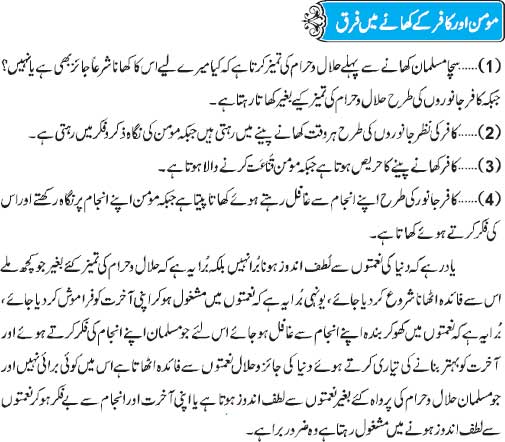
Ponder And Practice
It is narrated that Imam Hussain (as), grandson of the Holy Prophet (saw), said to a man who was backbiting another before him,
‘O you, stop backbiting, for it is the daily meal of the dogs of Hell.’
A person asked Allah’s Messenger (may peace and blessings be upon him) who among Muslims were better. Upon this (the Holy Prophet) remarked: One from whose hand and tongue, Muslims are safe.
Commentary
Are others safe from your words (back-biting, comments, sarcasm, hurtful jokes, fitnah, etc) and your deeds (retaliation, plotting, etc)?
Angels stand by your side, recording your words. It is better to be silent than to comment. “Speak good, or else be silent,” says Rasulullah (saw). Busy yourself with finding your own faults, and you shall have little time to comment on others.
Angels stand by your side, recording your deeds. It is better to forgive than to retaliate. Busy yourself with seeking forgiveness for your own soul, and you shall have little time to plot revenge or to ponder about the deeds of others.
When others are safe from your words and deeds, it means that you are now safe from words and deeds that will destroy you on Judgement Day. On that Day, Man will regret what evil he has said and done. He will be filled with relief, for all the evil which was not said and done. So restrain yourself, for your own good.
Will you not then take heed?
Ponder and practice.
Rasulullah S.A.W said, “An intelligent person is one who is constantly thinking about and preparing for death.”
Think about it. How does one prepare for death?
1) By seeking knowledge of Islam. So study about Allah, his Prophet, of good deeds and evil deeds. But knowledge itself is useless without…
2) Practising it. Perform good deeds, small or big, and avoid all evil deeds. But all performance is useless unless you are…..
3) Sincere (Ikhlas). To do lillahi ta’ala. But you will never achieve sincerity, as long as you do not have…
4) True Faith (Iman). You must
- truly believe in Allah,
- truly be in awe of Allah,
- truly depend and ask only from Allah,
- truly hope from Allah,
- truly fear Allah,
- truly put your trust in Allah.
But such faith does not come from reading books or talking about Islam or listening to fiery speeches about Islam; it comes from…
5) Striving hard in Allah’s path (Jihad). This does not mean going around trying to convert the world to Islam; it does not mean waving a sword at disbelievers showing them the ‘terror’ that Islam can inflict. It means fighting hard to cleanse the evil in yourselves –
- the jealousy,
- the greed,
- the stinginess,
- the arrogance,
- the pride,
- the laziness,
- the hatred,
- the lack of faith,
- the stupidity,
- the blindness of the heart,
- the backbiting and
- all the terrible sins that we do day after day, year after year until death comes a calling.
That is jihad. As you can see, this is a full-time job, that will take all your life to complete. But you will never start to strive for all this until you begin to…
6) Realize…
- Realize that you will die soon.
- Realize that you will be shown all your deeds (good and bad) on Judgement Day.
- Realize that Allah watches you all your life and that no deed escapes His repayment.
- Realize that money, fame, and property cannot buy your way out of Hell.
- Realize that only iman and good deeds can.
- Realize that you live only once.
- Realize that you are responsible for yourself.
- Realize that in the end, you are the one who will gain or lose.
- So many people have realized, studied Islam, and yet have gone astray – becoming terrorists, extremists, and fundamentalists. Why?
They have forgotten the most important thing in Islam. Which is that…….
7) Islam is about yourself. Correcting yourself. Cleansing yourself. Not about fighting with people or proving other people wrong.
- In the grave, you will be asked about yourself.
- What you did.
- What you said.
- What was your intention?
Then Allah will tell YOU, what is your final destination.
“And do not be as those who forget Allah, then Allah makes them forget about themselves….”Al-Qur’an.
Have you thought of yourself lately? Every man who forgets about himself lands in Hell.
Ponder…and practice.
Masjid Mein Sawal Karnay Aur Sail Ko Denay Kay Ahkam
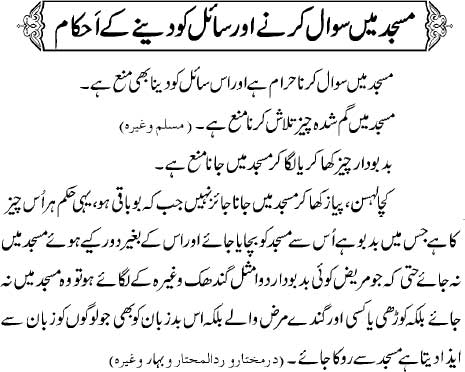
Fuel Of Hell
Stones and the rebellious disbelievers are the fuel of Hell, as Allah says:
“O you who believe! Save yourselves and your families from a Fire whose fuel is men and stones!” (66:6)
What is meant by the people who will be fuel for the Fire are the disbelievers and polytheists. As for the type of stone that will fuel the Fire, Allah (SWT) knows best what it really is. Some of the Salaf thought that this stone was brimstone or sulphur. ‘Abdullaah ibn Mas’oud said, “It is a stone of sulphur which Allah (SWT) created in the first heaven the day He created the heavens and earth and prepared it for the disbelievers”. This was reported by Ibn Jareer, Ibn Abi Haatim and Haakim in al-Mustadrak. Ibn ‘Abbaas, Mujaahid and Ibn Juryayj were also of this opinion. (Tafseer Ibn Katheer, 1/107)
If this opinion was based on something that the Prophet (saw) had said then we could accept it without hesitation or argument. If it is a matter of Ijtihad, based on knowledge of the nature and qualities of stones, then we cannot accept it without question. There may be other stones that are superior to sulphur in strength and flammability. The first Muslims saw that sulphur has qualities that do not exist in other stones, so they thought that it would be the fuel of Hell. Ibn Rajab said, “Most of the mufassireen suggest that what is meant by stones is sulphur, with which the Fire of Hell will be fuelled. It was said that it includes five kinds of torment that are not found in other stones: it catches fire quickly, it has an unpleasant odour, it produces a lot of smoke, it sticks to the flesh, and it is very hot when it is heated” (Ibn Rajab, at-Takhweef min an-Naar, p.107). Allah may create other kinds of stones that are superior to sulphur, and we can be sure that whatever exists in the Hereafter will be different from this world.
Another fuel for the Fire will be the gods, which were worshipped instead of Allah (SWT);
“Certainly! You [disbelievers] and that which you are worshipping now besides Allah, are [but] fuel for Hell! [Surely] you will enter it. Had these [idols etc] been aaliha [gods] they would not have entered there [Hell] and all of them will abide therein.” (21:98-99)
“al-Jawhaari said, “Everything that is used to feed the Fire or increase it is its fuel”. Abu Ubaydah said, “Everything that you throw into the Fire is fuel for it” (Yaqazah uli al-i’tibaar, p.61)
- August, 12
- 1293
- Paradise-Hell
- More
Jumma Wajib Honay Kay Liye Sharait

Signs Within Ourselves
We will show Our signs to them in the universe, and in their own selves until it becomes manifest to them that this (the Qur’an) is the truth. Is it not sufficient in regard to your Lord that He is a witness over all things? (Qur’an, 41:53)
The Qur’an uses “nafs” (self) to express consciousness, the quintessence of our personality. “Nafs” is integrated with our physical body; the author of all good and bad acts is our “nafs.”
The atoms of our physical body – of which 99 percent is vacuum – are deprived of all consciousness, and perform such conscious acts as seeing, hearing, and thinking.
The verse above alludes to signs in ourselves. There are prior categories that the mind is constitutionally endowed with, concepts or ideas that are not derived from experience.
Here we find ourselves surrounded by available data of a rich philosophical background. The tribe to which the Prophet (peace be upon him) belonged dealt in trade and animal husbandry. The Prophet (peace be upon him) himself was not brought up in a milieu like Plato’s Academy or in an environment where the colorful and lively schools of philosophy like Cartesianism flourished. Therefore, the fact that the Qur’an made a distinction between the outward signs and the signs imminent in man’s soul is noteworthy.
The basic message transmitted by all the religions revealed by God is the fact that He is a Perfect Being. This becomes all the more apparent when we witness all the entities created by God. In the ontological argument, attainment of God is achieved not through exterior means, but from the idea of “Perfection” or “Perfect Being” inherent in each of us.
Farabi and Avicenna were among the first philosophers to refer to the initial arguments of ontology. Farabi analyzes the ontological argument together with the cosmological argument. According to them, God must be self-existent (Necessary-Being); assuming that He does not exist would be a contradiction in terms. All other creatures are possible creatures; both their existence and nonexistence can be a topic of discussion. If the possible entities are not resolved in the Necessary-Being, there would be a contradiction in terms. Given the fact that Farabi ‘s conclusion is a combination of ontological and cosmological arguments, many thinkers are believed to have found traces of this for the first time in the works of Avicenna.
Nevertheless, this argument is, more often than not, associated with Descartes. To avoid committing an error, he sets out in his philosophical quest by considering all past knowledge as if it were nonexistent. He begins with the statement that many of the preconceived opinions he has accepted since childhood have turned out to be unreliable; so it is necessary once in a lifetime to demolish everything and start again right from the foundations. There follows a systematic critique of previous beliefs. Anything based on the senses is potentially suspect since I have found by experience that the senses sometimes deceive and it is prudent never to trust completely those who have deceived us even once.
Elsewhere Descartes expresses this “cogito argument” in the famous phrase, “cogito ergo sum” (I think, therefore I am). He derives from this argument that he exists incontestably and that thinking can never be confused. Later he realizes that knowing is more perfect than doubting and explains how this idea of perfection leads him to the most perfect, to the idea of a supremely perfect Being.
He reasons that the representational content (or objective reality) of this idea is so great that it cannot have originated from inside his own (imperfect) mind, but must have been planted in him by an actual Perfect Being – God. Things outside him like the sky, the earth, the light, the heat, and a thousand other things, all these things contained nothing that would surpass him. If they were unreal he might have concluded that he had acquired them from the void. However, this could not hold true for a Perfect Being. He could not have acquired it from nothingness.
Descartes concluded the existence of God after having examined the evidence inherent in the self. He said that this conclusion was not an invention of his imagination and that to add or subtract anything to or from it was beyond him. He had to accept the fact that he had come to the world with this a priori sign. Like the initials that an artist imprints on his work, God had implanted this idea as He created him.
A True Muslim
Our Prophet (sall-Allahu alaihi wa sallam) declared: “I have been sent down to perfect virtue and to spread beautiful morals over the world. Another hadith-i-sharif state: “Among you, the ones with perfect morality are the ones with an elevated faith.’ Therefore, even faith is measured by morality.
Spiritual purity is essential for a Muslim. A person who lies, who cheats, deceives others, is cruel, unjust, shirks from helping his co-religionists, assumes superiority, thinks only of his advantages, is not a true Muslim, no matter how much he worships. The exalted meaning of the first three verses in Chapter (sura) Maun is: “O! My Messenger! Have you seen someone who denies the Judgement, puts the orphan aside with harshness, does not give their rights, and does not encourage others to feed the needy?’ The worship of such people is not accepted. In Islam, keeping away from the prohibitions (haram) takes precedence over doing the commandments (fards). A true Muslim is, first of all, a perfect and mature person. He has a smiling face. He is a honey-tongued man who tells the truth. He never knows what it is “to be angry.’ Rasulullah (Hadrat Muhammad [sall-Allahu alaihi wa sallam]) declared: “The person given mildness is the one endowed with the goodness of this world and the Hereafter.’
A Muslim is extremely modest. He listens to everyone who consults him and helps them as far as possible.
A Muslim is dignified and polite. He loves his family and his country. Our Prophet (sall-Allahu alaihi wa sallam) declares: “Your love of country originates from your faith.’ That is why, when the government fights against aggressors, a Muslim does his military service willingly. It says as follows in a work written by a German priest in 1560, which has been mentioned above: “Now I’ve understood why the Muslim Turks overcame us in all our expeditions. Whenever there is a holy war here, the Muslims immediately take up their arms, fight and die willingly for the sake of their country and religion. They believe that those who die in a holy war will go to Paradise. In contrast, in our country, when there is a likelihood of war, everyone looks for a hiding place lest they should be enrolled in the army. And those who are recruited by force fight reluctantly.
How Allahu taala likes His slaves to be, is explained very well in the Quran al-karim. The exalted meanings of verses 63-69 in Chapter Furqan are: “[The virtuous] slaves of the Rahman (Allahu taala, who has much compassion for His slaves) walk on the earth modestly and yet with dignity. When ignorant people try to annoy them, they respond with kind words, such as peace and safety be on you! They spend the nights standing and prostrating [performing namaz] before Allahu ta’ala. [They offer their thanks and praise to Him]. They entreat Allah, O my Allah, take the Hell torment away from us. Indeed, His torment is eternal and bitter, and that place is no doubt an evil and horrible residence. In their spending, they are neither prodigal nor miserly; they follow a moderate way between these two extremes, and they do not violate anyone’s rights. They do not attribute partners to Allah. They do not kill anyone, which is prohibited by Allah. [They only punish the guilty.] They do not commit fornication.’ In verses 72-74 of the same chapter: “[Those virtuous human slaves whom Allahu taala likes] they do not bear false witness. They abstain from things… useless and harmful. If they are accidentally involved in something useless or which can be done with great difficulty, they pass by in a dignified manner. They do not turn a blind eye and a deaf ear to the revelations of Allahu ta’ala when they are reminded of them. They implore saying, O my Allah! Bestow such wives and children as may be a source of comfort to our eyes. Make us examples for those who fear You.’
Moreover, the sacred meaning of the second and third ayahs (verses) in Sura (chapter) Saff: “Believers! Why do you profess what you never did? Allah dislikes you when you say something you cannot practice,’ which shows that a person’s vowing or promising what he cannot perform makes him a bad person in Allahu taala’s view.
A true Muslim is extremely respectful to his parents, teachers, commanders, the laws, and the leading authorities of his country. He is not concerned with something insignificant. He is busy only with something useful. He doesn’t gamble. He doesn’t kill his time.
A true Muslim does his worship perfectly. He offers gratitude to Allahu taala. Worship should not be performed unwillingly or unconsciously. Worship must be performed willingly and with great love for Allahu taala. To fear Allahu taala means to love Him very much. You do not want the person you love much to be displeased and you are afraid lest you might cause him to be disturbed. In this way, worship for Allahu taala should be performed in such a manner as to prove our love for Him. The blessings that Allahu taala has given us are so great that our debt of gratitude to Him can be paid only by loving Him much and by worshipping Him with profound sincerity. There are different kinds of worship. Some kinds of worship, as we have said above, are between Allahu taala and His slave. Maybe Allahu taala will forgive those who worship insufficiently. It is worship to respect others’ rights, too. But He will never forgive those who abused others and have the rights of others on them, unless the owners of those rights forgive them.
Namaz Fasid Karne Wali Cheezon Ka Bayan
